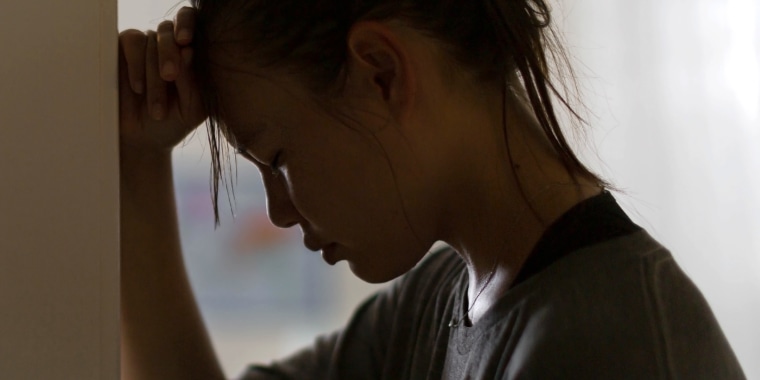Many parents know all too well that their children and teens are struggling with mental health challenges during the COVID-19 pandemic. The problem has become so alarming that U.S. Surgeon General Dr. Vivek Murthy issued a 53-page report warning about it.
“When the surgeon general puts out a report, they are saying not only is this noteworthy evidence-based research but also there are calls for systemic change,” Dr. Deborah Gilboa, a parenting and resiliency expert, told TODAY Parents.
“This is good news for kids,” Gilboa continued. “It is making mental health a more ‘usual’ conversation — easier for families to feel like they can ask for help, easier for educators and after-school programs to mention mental health to families without as much pushback.”
What’s more, it helps children grappling with mental and emotional stress to feel less alone.
“This report centers kids. One of the important conversations that’s happening is inclusion: nothing about them without them,” Gilboa said. “They’re saying, ‘What can young people do themselves?’ And then the rest of it is, ‘What can family members do? Educators, health care organizations, media, community funders, foundations, employers, government?’ They’re really calling on everybody who intersects with kids.”
Some parents might sense immediately when their children are starting to struggle, but for others it might be tougher to tell. Gilboa urges parents to consider their children’s warning signs.
She advised parents to remain alert for these dangerous red flags:
- Self-harming behavior
- Substance abuse
- “Tremendous” change in how and what they eat
- Dramatic sleep changes — too much or too little
- Withdrawing from relationships
- Damaging relationships
- Lying
- Thoughts of death or suicidal ideation
“Parents don’t wonder if they’re seeing red flags — they know something’s wrong,” Gilboa said. “They may not know what to do about it. They might be frustrated. They might hit obstacles.”
U.S. Surgeon General Murthy urges parents to think of mental health much like they would physical health. That means that earlier intervention often works better. Similarly, Gilboa encourages parents to seek mental health resources for their child before a problem arises. Then, if there is an emergency, they will know where to take their child.
Parents also should look for warning signs — yellow flags — so they can help their child as early as possible.
“Every child’s yellow flags are a little different,” Gilboa noted.
For example, Gilboa can tell when one of her sons feels overwhelmed because his room becomes messy. But another son’s sign that he's feeling stressed is that he cleans his room without prompting.
“One thing you can do is remind yourself, ‘I am an expert in this kid. So what are the yellow flags that will cause me to wonder?’ And then the litmus test is if you say, ‘I really don’t know,’” Gilboa said. “If your child is surprising you in a good or bad way, get curious. Go to your child and say, ‘I noticed this and I’m wondering what’s going on?’”
While it's essential to identify a child who is in crisis or is having a tough time, Gilboa said there are specific steps parents can take over the winter break and holiday season to help bolster kids’ resilience:
1. Take breaks and catch up on sleep
Adults often talk about self-care, “me time” and the importance of rest. Children and teens need that, too. Use the winter break from school to look at the family’s schedule and build in rest time.
“You first schedule in the time that your family needs itself,” Gilboa said. “What if you protected that time like you protect their school time and your work time?”
This is also a good opportunity to allow children to get some extra Z’s. Studies have shown the importance of sleep for children and teens; one study from April 2021 found that students who start school later feel less groggy during the day. While parents might balk at their children sleeping into the afternoon, it likely will help them feel better equipped to cope.
“Don’t forget this is an opportunity to catch up on sleep,” Gilboa said. “Do not worry about them sleeping in over break. It’s really good for that. Make sure there’s time for sleep and maybe even naps and hydration and nutrition.”
2. Build connections
Many children and teens have a friend, family member or mentor who really makes them feel amazing about themselves. Parents can help them re-connect with people who encourage them to thrive.
“If it’s a friend that’s a little further away or on a different schedule and it’s hard for them to usually get together, make sure that they get that chance,” Gilboa said. “That’s one thing that parents could really focus on: Helping their kids strengthen a connection or two that really fills up their child.”
3. Help them to set boundaries
“One skill that really helps kids build resilience is learning to set boundaries — knowing what they will do because they’re clear about what they won’t do,” Gilboa said.
Boundaries look different for each child, and they can involve anything a child feels is important. Gilboa stresses that children should not be forced hug any relative they don’t want to hug, for example. In other cases, children might not want to talk about their weight. They can tell adults that it’s simply not a topic they wish to address.
Gilboa also encourages parents to sit down with their children before the next semester to talk about how much time homework and other activities might be taking them, as well as which activities they want to continue. In that process, they should earmark time for their children to recharge.
“Let’s really make sure that you block out time you need for relaxing and recovering each day or on the weekends,” Gilboa said. “This is such an incredible life skill for kids to have and it will keep them safer this year.”
Related:
